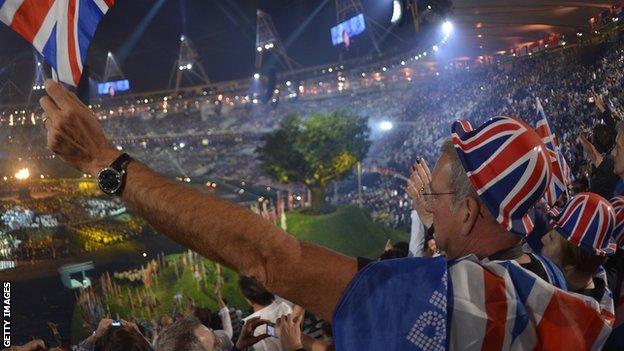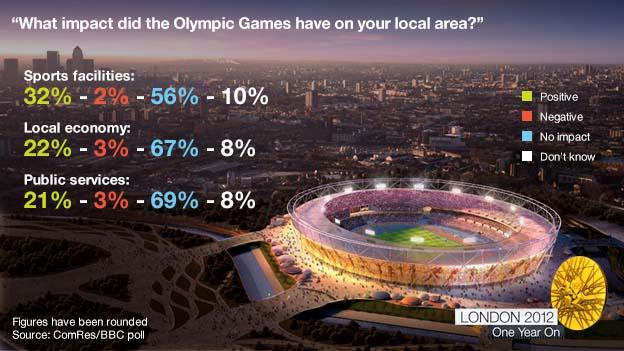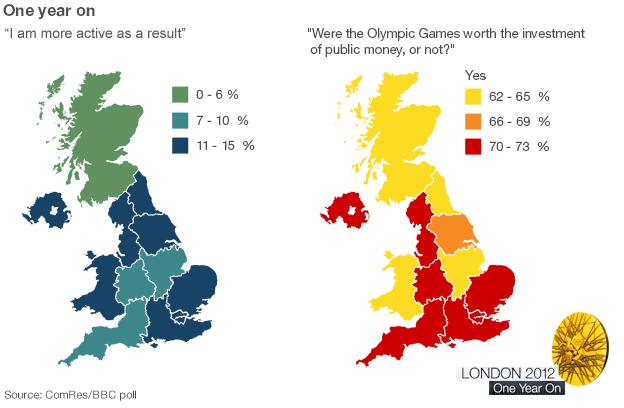London 2012: UK public says £9bn Olympics worth it
- Published
- comments

More than two-thirds of the UK public believe the £8.77bn cost of the London 2012 Olympics was worth the money, according to a ComRes poll for the BBC.
It indicates 74% would also welcome the Games back to Britain.
The results suggest people are more active since the Olympics, with 11% exercising more than a year ago, rising to 24% for those aged 18 to 24.
The London showpiece, together with the Paralympics, cost more than three times the original budget of £2.4bn.
Recent government research suggests the UK economy received a £9.9bn boost in trade and investment from staging the Games.
A year on from the start of London 2012, the survey of 3,218 adults, conducted by ComRes, aims to understand public perceptions of Olympic legacy and what impact the event has had on communities.
It found, external that, of those polled:
11% said they are more active as a result of the Games;
32% said the Games had a positive impact on sports facilities;
22% said the Games had improved their local economy;
21% said the Games had resulted in improved public services.

One of London's legacy promises, external was to "inspire a generation".
And with many of the stars of London 2012 preparing to compete at the Anniversary Games at the Olympic Stadium this weekend, the poll suggests young adults are the most enthusiastic about the Games returning to Britain, with 82% of those aged 18 to 24 keen on the idea.
On the issue of cost, 69% of people responded positively to this use of public money, although a higher percentage of those came from the South East, where most events at the Games were staged.
In the BBC South East region, 78% were happy with the cost, compared with 63% in BBC Yorkshire.
On the issue of people becoming more active, the last Labour government pledged that two million, external would play more sport as a result of the Olympics. That target was later revised to one million.
People in the BBC North East and BBC Cumbria regions are likely to have been the most active, according to the survey, with people in the BBC South West and BBC West Midlands regions the least.
However, 88% of those polled said their activity levels had not changed following the Games, which ran from 27 July to 12 August.

A recent Sport England study suggested that the number of people participating in sport once a week fell by 200,000 between October 2012 and April 2013.
But Sport England points out that, according to its figures, there are still 1.4m more people playing sport than in 2005, when London won the right to stage the 2012 Olympics and Paralympics., external
Lord Coe, who was chairman of the London Olympic Organising Committee and is now Olympics legacy ambassador, told BBC Breakfast: "The overall response to your survey has been incredibly positive.
"It doesn't surprise me given the boost to the economy we revealed the other day.
"Again your survey shows a positive outcome of regional spread of interest. It was one of the ambitions we set out very clearly. We did not just want to talk about the three weeks in London."
On the issue of legacy, Sports Minister Hugh Robertson said: "We've made an incredibly good start, but I would be the first to admit there is an awful lot left to do.
"I don't think we'll be able to make a judgment until three years after the Olympics, maybe five, and probably, if we are being really honest, until a decade has passed."
He added: "The single most important legacy we have got from London 2012 is that, everywhere I go around the world, people still reminisce about the Games and say 'well done' for laying on the best Olympics and Paralympics of all time.
"That is a calling card that is worth a lot in the international market."
Double Olympic champion Rebecca Adlington, who quit competitive swimming after winning two bronze medals in London, added: "Legacy is a difficult subject for people to talk about because people want to see it happening straight away.
"For me, what will be a nice moment is, in 10 or 15 years, seeing someone come out of a pool or the velodrome, doing their interviews and saying, 'I was inspired by London; it got me into sport'. That is what legacy is about."
Mo Farah, who won the 10,000m and 5,000m titles in 2012, said: "We did the best job any country could ever do. After the Olympics so many kids have got involved into sport and been more active.
"We should be proud of what we did."
A key part of the London 2012 legacy plan, external focused on sports facilities. Of those polled, 32% said they had noticed an improvement, although more than half said there had been no impact at all.
One in five people polled reported an additional benefit to their local economy and public services.
However, 69% said there has been no impact on public services, while 67% said they have not witnessed any impact on the local economy.
Tim Lamb, chief executive of the Sport and Recreation Alliance, the organisation responsible for the governing and representative bodies of sport and recreation in the UK, said: "It's very important to keep the momentum going.
"We're going to have to find a way of investing in facilities in our sports clubs, making sure that when facilities are hired for sporting activity they are affordable, making sure that clubs and people playing sport have got the right equipment.
"It's about spending money more wisely and recognising the enormous social benefits that sport has.
"It is obviously good for your health, it can help to reduce anti-social behaviour, it's proven to improve academic attainment and it can help build community cohesion. It's a very low-cost way of tackling some of the key social problems that we've got in this country."
Between 5 and 21 July 2013, telephone interviews were conducted with 3,218 adults and the data, external weighted to be representative of all United Kingdom adults aged 18 and over.
Have your say on the survey and Olympic legacy via Sportsday Live.
There is more discussion and debate about Olympic legacy where you live throughout the day on your BBC local radio station.
- Published26 July 2013
- Published26 July 2013
- Attribution
- Published26 July 2013
- Published25 July 2013
- Published25 July 2013
- Published25 July 2013
- Published22 July 2013
- Published25 July 2013
- Published25 July 2013
- Attribution
- Published22 July 2013
- Published19 July 2013
- Attribution
- Published19 July 2013
- Published13 June 2013
- Attribution
- Published23 July 2013
- Published17 May 2013
- Published10 January 2013
- Attribution
- Published19 November 2012